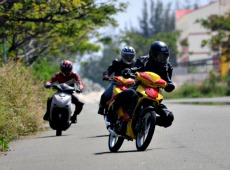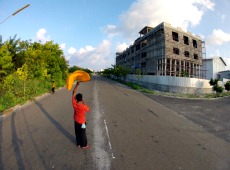The Maldivian government has narrowly failed to reach its target of one million tourist arrivals for 2012, according to figures released by Ministry of Tourism, after a year of political turmoil and an economic slump in key markets.
Despite arrivals falling short by roughly 42,000 tourists, figures released by the ministry have shown that overall arrivals rose 2.9 percent from 931,333 in 2011 to 958,027 in 2012.
Prior to the release of the figures, Tourism Minister Ahmed Adheeb predicted that while there may be a shortfall of roughly 20,000 in 2012, he was confident the ministry could achieve the one million mark in 2013.
“There were a lot of hiccups last year with the political turmoil that the country experienced. It is important that we do not compare ourselves to other destinations like Sri Lanka or Seychelles, as our tourism market is very different. We have a high-value tourism market.
“We will formulate a strategy to go forward this year and later this month [January] we are going to finalise the fourth master plan of tourism. I am sure we will get one million tourists in 2013. I can assure you of it,” Adheeb told Minivan News earlier this month.
Figures released by the tourism ministry show that Europe, which accounted for 54 percent of all tourist arrivals in 2012, fell by 3.7 percent from 537,757 in 2011 to 517,809 in 2012. Arrivals from the United Kingdom – the second highest share of European arrivals to the Maldives this year – continued to fall from 104,508 in 2011 to 91,776 in 2012 – a 12.2 percent drop.
Germany took over the UK in 2012 as having the largest share of European arrivals to the Maldives, growing by an extra 7,834 arrivals from 90,517 in 2011. The 8.7 percent increase in arrival numbers, meant that Germany was accountable for 10.3 percent of all tourist arrivals in 2012.
Italy, which had the second highest arrival share of European tourists in 2010, fell drastically in 2012 by 24.4 percent from 83,088 arrivals to 62,782.
Meanwhile, tourist arrivals from ‘Asia and Pacific’ regions continued year-on-year growth from 2010, increasing by 10.2 percent from 2011 and accounting for a 40.1 percent share in the overall market at 384,506 arrivals in 2012.
Shift to ‘low yield’ Chinese tourists
Chinese arrivals continued to grow in 2012, with a 15.6 percent increase from 198,655 in 2011 to 229,551 in 2012.
Chinese tourists now account for the largest share of arrivals from any nation in 2012 standing at 24 percent, a massive increase from Chinese arrival figures in 2009 which stood at 60,666.
Despite the high number of Chinese tourists, tourism experts stated back in 2010 that Chinese guests were relatively ‘low yield’ despite their high numbers.
Speaking to Minivan News in 2010, the now former Secretary General Maldives Association of Tourism Industry (MATI), Sim Mohamed Ibrahim, said Chinese tourists tended to spend less than their European counterparts.
“The Chinese who come do not come for the sun and the beach – they come because the Maldives is a novelty, a safe destination, and because of their new-found freedom to travel. Resorts are saying there are not many repeat visitors from China,” he said at at he time.
Tourism growth slowed to less than one percent in 2012
Tourism growth meanwhile slowed to less than one percent in 2012. While the tourism industry grew by 15.8 percent in 2010 and 9.1 percent in 2011, the industry’s growth in 2012 was expected to be 0.7 percent.
The two main reasons cited by the Finance Ministry for the anaemic growth were “the political turmoil the country faced in February” and a decline in the average number of nights tourists spend in the country “as a result of a decline in the average number of days a tourist spent in the Maldives.”
On average, tourism accounted for 28 percent of GDP during the past 10 years.
Despite the widely reported Ibrahim Nasir International Airport (INIA) dispute between the Indian infrastructure giant GMR and the Maldivian Government in December last year – as well as claims of anti-India sentiment within the country – arrivals from India increased by 34 percent in December compared to the same month in 2011.
The largest increase in tourist arrivals compared to 2011 was from the Middle East, which saw close to a 50 percent rise in arrivals for 2012 at 21,843 from 14,570 in 2011.
Arrivals from United Arab Emirates grew the highest in percentage from 2011 by 76.6 percent. Despite the high percentage growth however, the number of tourists was comparatively low to other countries standing at 4,047 in 2012.
MVR 70 million tourism marketing budget in 2012
The Maldives Marketing and Public Relations Corporation (MMPRC) was allocated a budget of MVR 70 million (US$4.5 million) in 2012 to conduct marketing activities for the year, almost double the 2011 budget of US$2.3 million, which saw the country receive 900,000 tourist arrivals.
Following February’s controversial transfer of power, the incoming government of President Dr Mohamed Waheed Hassan sought to utilise public relations groups and advertising to try and offset the impact of negative news headlines resulting from the controversial nature of the change in government.
That focus included a US$250,000 (MVR3.8million) advertising deal to promote the country’s tourism industry on the BBC through sponsorship of its weather services, as well as signing a £93,000 per month (US$150,000) contract with public relations group Ruder Finn to try and improve the country’s image internationally.
Maldives tourism authorities said back in October that they were confident the country would meet its one million visitor target, despite ongoing “political turmoil”.
Registered beds up, occupancy rates down
According to the 2012 statistics released by the Tourism Ministry, the average number of registered beds between resorts, hotels, guest houses and safari vessels stood at 27,702 in 2012 – an increase of 1,346 from 2011.
Despite the increases in tourism arrivals, bed nights fell from 6,529,200 in 2011 to 6,450,794 – a total drop of 1.2 percent – and the average days spent in the Maldives by tourists fell from 7.0 days in 2011 to 6.7 days in 2012.
Occupany rates also fell across all types of accommodation aside from a 1.9 percent increase on safari vessels. Altogether the occupancy rates fell from 73.1 in 2011 to 70.6 in 2012.
Maldives top five markets by visitor numbers (2012)
China: 229,551
Germany: 98,351
United Kingdom: 91,776
Russia: 66,378
Italy: 62,782
Likes (2)Dislikes
(2)Dislikes (0)
(0) 

